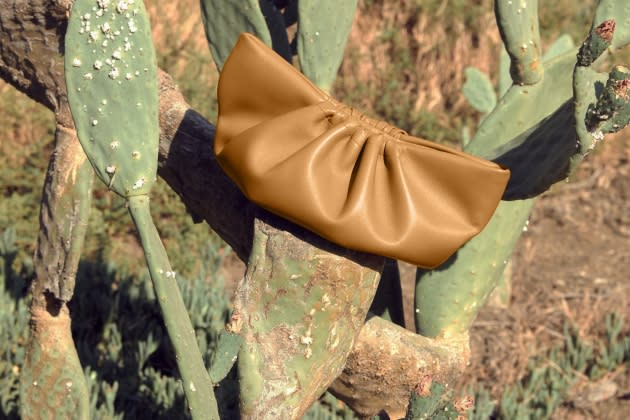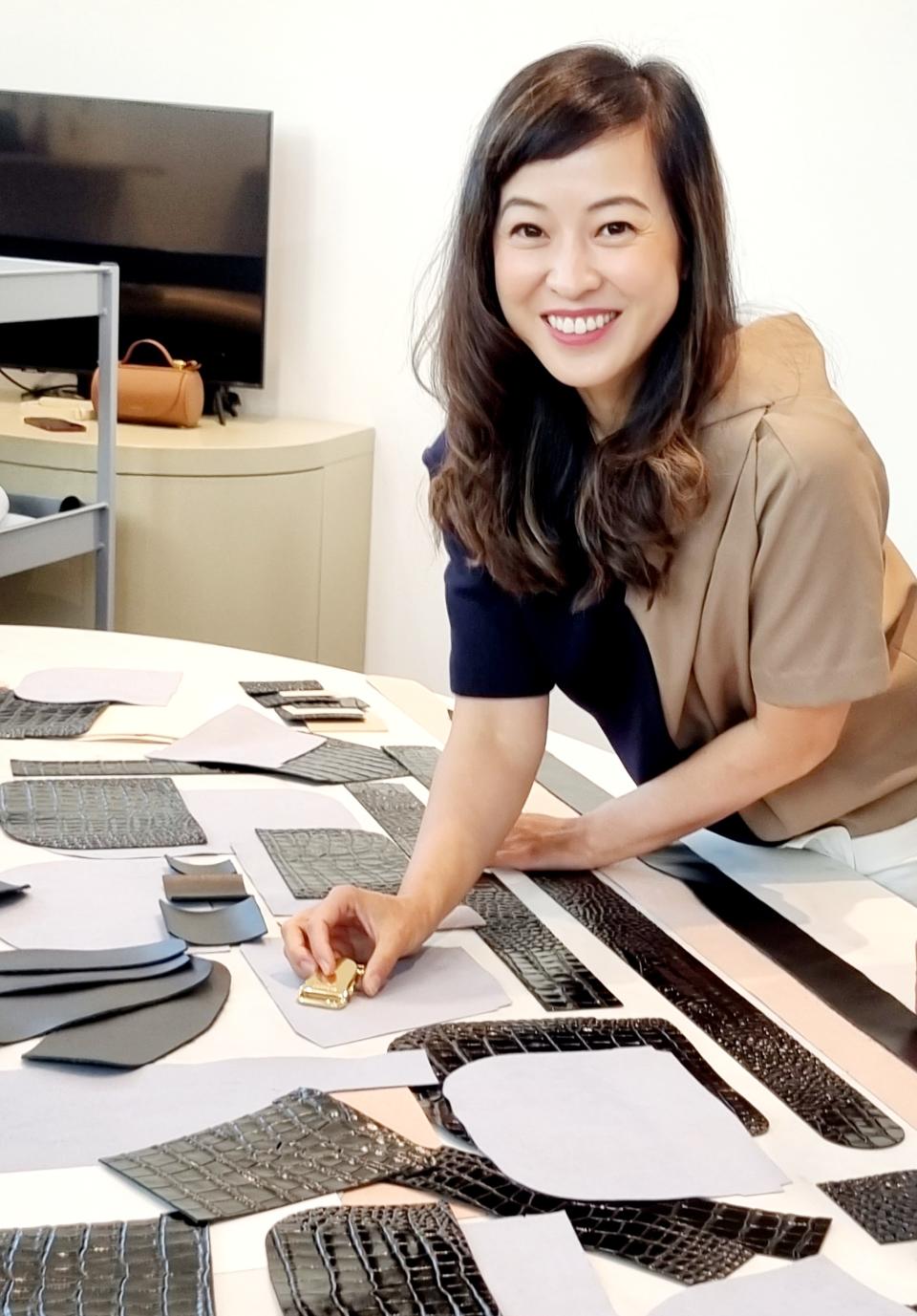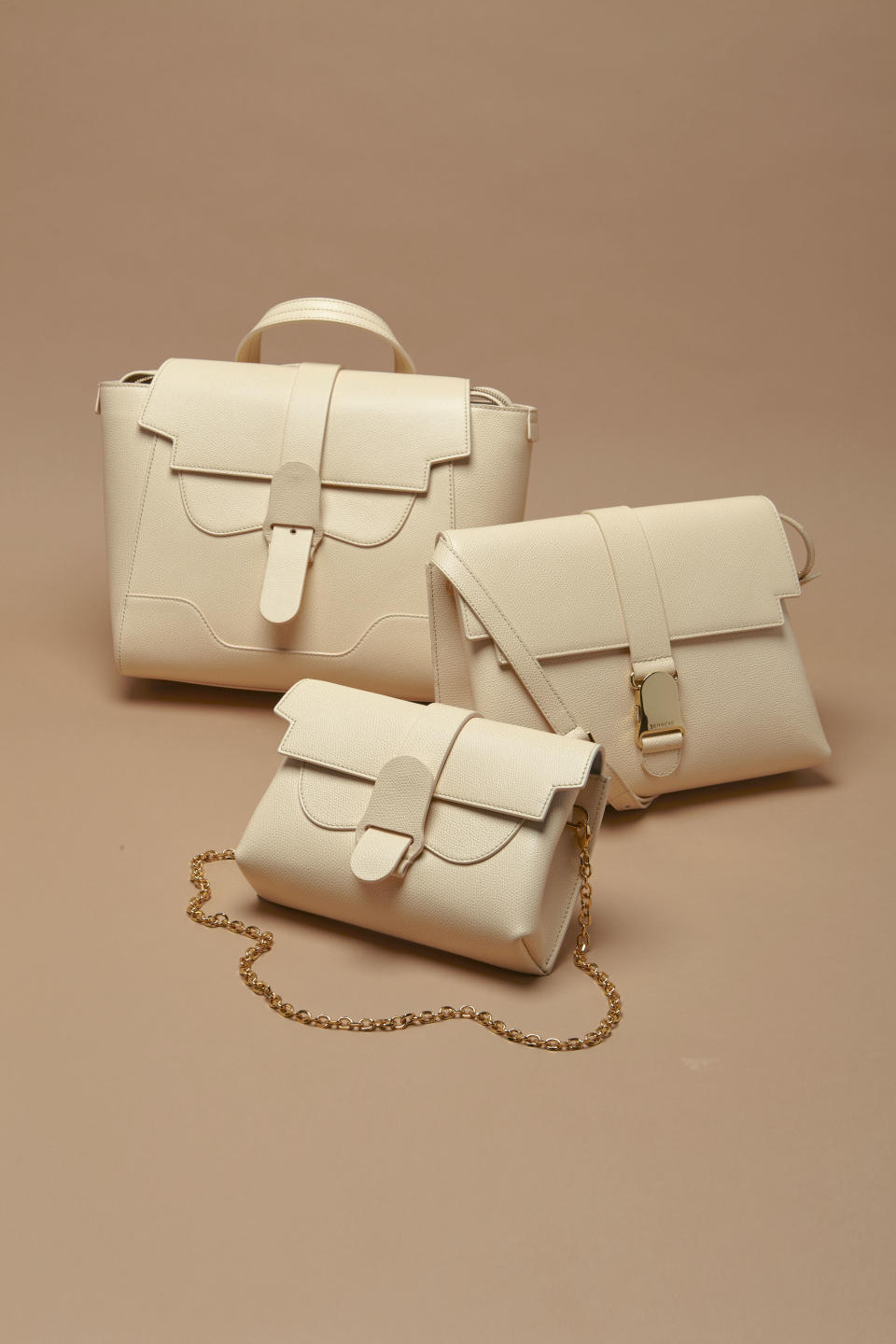Senreve’s Blend of Luxury, Versatility and Sustainability

Senreve is a small luxury accessories company striving to make a big difference.
“By 2023 our goal is to have 50 percent of our offering be vegan and sustainably sourced materials,” said Coral Chen Chung, founder and chief executive officer of Senreve.
More from WWD
“We currently have four vegan leather offerings and have worked each year to find innovative, new, more sustainable materials,” Chung said.
Leather has traditionally come from the slaughter of cattle, raising concerns about animal welfare and impact on the planet, and recently there’s been a movement to use plant-based materials, such as cactus and pineapple leaves as alternatives to animal-based leather.
In 2020, Senreve launched its first four vegan leather bags. In 2021, Senreve started developing leather bags using Mexican cactus carefully trimmed to never damage or destroy the plant. Cactus requires little water and grows by absorbing C02, minimizing the carbon footprint for production.
In 2022, Senreve started using BioFabbrica — produced by the Modern Meadow biotech company that uses biofabrication to create sustainable materials — to launch Vegan Terra Leather, which Chung describes as soft, supple and lightweight, yet durable, abrasion-resistant and water-resistant. BioFabbrica, made from 100 percent plant-based proteins and bio-polyurethane, “is a great substitute for animal leather, with a lot of sustainable qualities like less water consumption, less chemical usage and better color rendering. We were the first accessory brand to use that material commercially,” said Chung. Senreve also utilizes a differentiated pigmentation process that produces no dye runoff.
“It’s really indistinguishable from animal leather, and it’s not a lower-cost alternative to leather by any means,” said Chung. “It’s a more sustainable, animal-free option. We do see a lot of demand for that from our community. We have sold out of several colors and styles since we launched it six months ago.”
Down the road, “We have the potential to go fully vegan but there are still some technology and supply chain challenges, but eventually we will be heading in that direction,” Chung said.
“There is a lot of opportunity to make traditional leather more sustainable as well,” Chung added. “We will monitor that very carefully. The key for us is to have a product that is sustainable, has that performance quality and doesn’t sacrifice luxuriousness.”

Innovation is at the core of the six-year-old company.
Chung founded Senreve in 2016 after managing the retail vertical at Medallia, a software firm with a platform for customer experience insights. “I was always really passionate about luxury, fashion and accessories,” she said. She also sensed “a white space in the market for bags that do not compromise functionality, versatility and luxury, and for busy women on the go,” Chung said.
Chung is a major Senreve shareholder, while the lead investor is Norwest Partners. “It was a big deal when we raised capital from them at the end of 2019 because only about 2 percent of venture capital dollars goes to female founded and led companies,” Chung said. Chung said she’s the creative force behind all the products, but works with a product development and design team based in Florence and with artisan partners there as well.
Senreve’s first and most notable product is the “Maestra Bag,” which can be worn as a backpack, a crossbody, a satchel or a tote. “We are really known for the convertibility and versatility of our products. We have products that can be worn in different ways,” Chung pointed out.

The bags are typically designed with pockets and compartments for storing and easy access to phones, keys, key cards, credit cards and lipsticks, and even have ring hooks. Styles are designed with versatility, for dress-up or dress-down occasions. For example, a fancy chain can be switched with a casual leather strap, or bags can be carried using a top handle or a strap, or carried hands-free, creating different looks for the same bag. Bag chains can be worn as bracelets or necklaces.
The collection also features a “rainbow spectrum of color” and a range of leather finishes and styles from matte to shiny, lightweight to heavy, and smooth to textured, Chung said, adding that Senreve’s vegan leathers are durable, and scratch-, stain- and water-resistant.
The collection has grown to more than 100 stock keeping units, Chung said, though she declined to specify the company’s volume. The business has increased “very organically, by word of mouth.”
“We definitely have a lot of new products expansion opportunities,” Chung added. “We are doing more small leather goods and accessories, and introducing new shapes and styles, especially in the larger bag arena because people are traveling again and going back to the office.
“We have ambitions to expand into other categories as well. We have done some testing. We have offered some limited-edition products,” including jewelry, candles, cashmere and home fragrance. Foldable summer straw hats were a sellout and will be reintroduced next year.
The digitally native brand primarily sells through its own website as well as on Shopbop, Stitch Fix and offline with Neighborhood Goods. There are also two Senreve stores, in San Francisco and Singapore. A third is expected to open in New York City next year. Sites are being explored.
Asked if selling both animal leather and vegan bags sends a mixed brand message to shoppers, Chung replied, “The traditional barriers of defining yourself as a vegan brand or a leather brand is really not there anymore in the mind of the consumer. People are very accepting from a brand perspective. We are also that way. Senreve is focused on versatility. It’s about this idea of conflicting forces coexisting, dichotomies coexisting. It’s not in conflict with our brand message to offer multiple choices. In the beginning there was some risk around that, but the way we have executed has been very consistent with our brand vision and message.
“Senreve, meaning sense and dream in French, is about dichotomy coexisting,” Chung said. “The brand is meant to be very diverse and inclusive of different options. We want to create options and want to be very innovative. It’s consistent to where the consumer is headed. Gen Zers are open to defining themselves as they want to be defined,” in ways that are true to themselves.
“I’m not vegan but I am very mindful of making sustainable choices in my life,” Chung said. “My husband is a sustainability investor. Our personal portfolio is very focused on sustainable technologies and sustainable startups.”
Senreve accessories and bags range in price from about $85 to $1,200. “We command a high price point because the materials we use are quite innovative, high-quality and expensive,” Chung said.
Regarding the brand aesthetic, Chung said, “It’s very timeless, very feminine, witty, with a lot of color. It’s not 100 percent trend-driven, but there are elements that make it not so serious. It has an element of the unexpected.”

